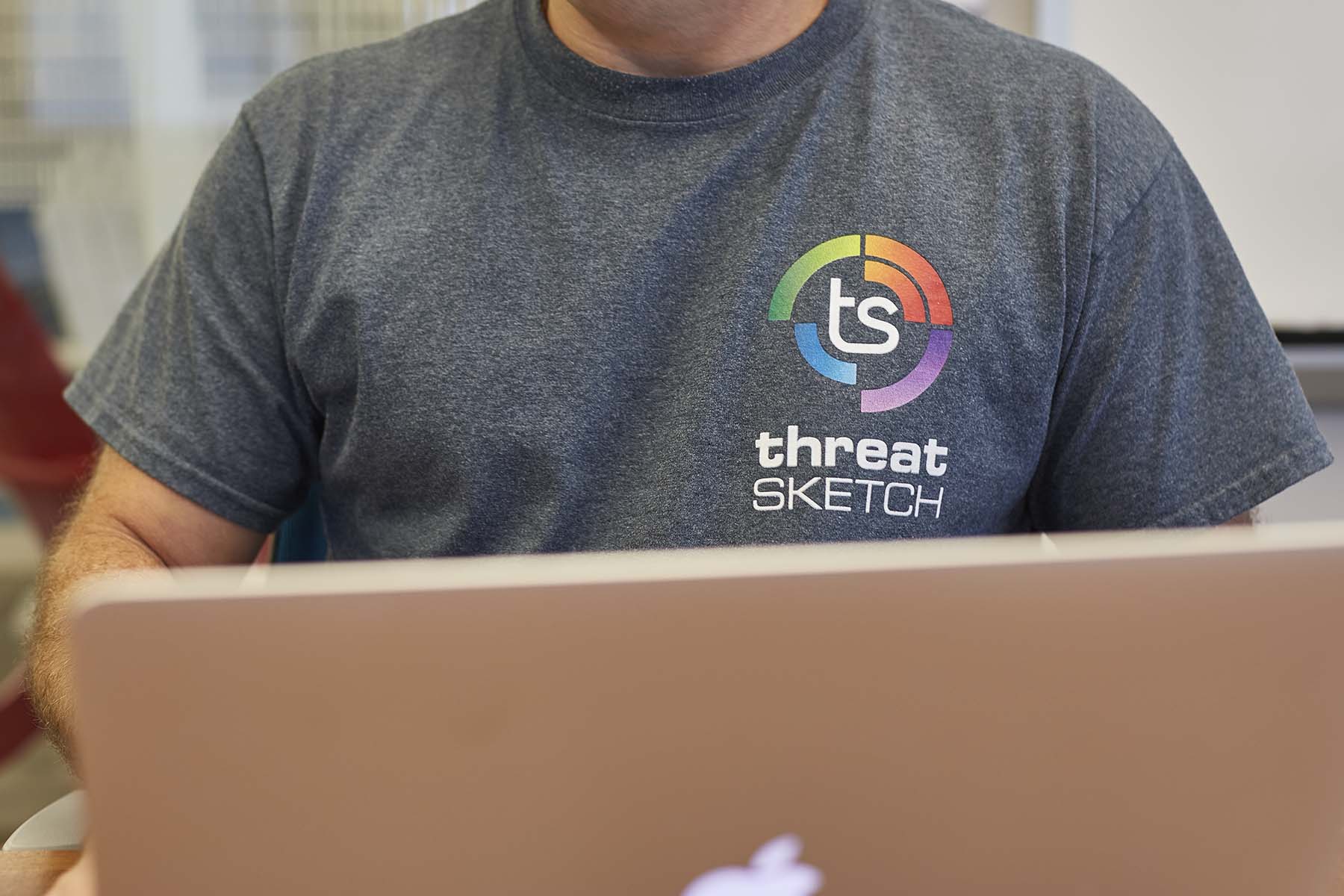The moment they met, Rob Arnold knew Nathan Powell was the one to help him get Threat Sketch—Rob’s cybersecurity start-up—off the ground.
“I showed Nathan what I was working on, and when he said ‘I know what you’re doing. I understand that,’ I was so relieved,” says Rob, an information technology consultant-turned-entrepreneur. “I had been trying to explain it to people, and they didn’t understand. But after meeting Nathan, I knew we had something viable.”
The two met as volunteers at a Start-Up Grind, an event series that educates entrepreneurs on how to improve their odds of start-up success, held at Flywheel Coworking in Wake Forest Innovation Quarter.
“After I saw what Rob was doing, I went home and thought about it a little bit,” says Nathan, a financial risk analysis consultant who builds analytical tools to examine large financial and economic datasets.
“What he was proposing was like what I do in financial risk assessment but applying it to information technology,” Nathan continues. “I hadn’t really thought about taking the same model and applying it to a different industry, but I realized there was a need and a market.”
That market consists of small businesses with cybersecurity needs that lack the resources or know-how to protect their assets. Rob was working on a cost-effective way for small business owners to identify their risks and prioritize solutions, something that would fill in the blanks for businesses that cannot afford to hire consultant firms.

In May, Rob and Nathan launched Threat Sketch’s first product—a cybersecurity risk assessment for small businesses.
With start-ups, as in real estate, location is key, and the entrepreneurs credit the resources and support of the local start-up community with helping them succeed.
“Our basic risk assessment is a culmination of all we’ve learned and all the resources available to start-up companies in Winston-Salem,” says Rob.
Threat Sketch
Today cybersecurity risks are on the rise, and cyber threats and hacks fill the headlines.
“Large corporations hire expensive firms to assess and protect their businesses from cyberattacks. Often small businesses don’t have the resources and expertise to pay for an assessment of their risks or prioritize what steps to take to protect their business,” says Rob. “What we try to do is to explain how cybersecurity is a significant and growing risk.”
Threat Sketch, founded within the walls of Flywheel in the Innovation Quarter, provides small businesses with an affordable way to assess their cybersecurity risks. The threat assessment—based on a 20-minute survey—gives small businesses a picture of the risks they face and includes suggestions for budget allocation, helping small businesses prioritize where to spend their limited resources.
Using sophisticated algorithms and a large data repository, Rob and Nathan’s product maps unique information about a company against the landscape of the industry and trends in cybersecurity to create a specific risk profile.



“You know there’s risk out there, but you can’t always pinpoint it,” says Nathan. “There’s a lot of value in helping people identify risk. That’s what we’re trying to do with this product: identify those hidden, unseen, misunderstood type of risks and then giving people a means to protect themselves against it.”
Rob and Nathan plan to build on the basic product to offer more sophisticated assessments and deeper analyses that companies can purchase, which will include information on potential losses from a cyberattack and predict what kind of insurance companies they should employ.
The Start-up Community
Interacting with the innovation ecosystem in the Innovation Quarter has been instrumental in giving Threat Sketch the right push at the right time.
After meeting at a start-up event in the Innovation Quarter, Rob and Nathan started working out of Flywheel on their new start-up.
“We tried to establish Threat Sketch in a traditional manner,” says Rob.
That changed when the two applied for and won a spot in a Startup Bootcamp, a weeklong deep dive into the nuts and bolts of launching a start-up, hosted by Flywheel in connection with the Startup Factory in Durham. During the Startup Bootcamp, Rob and Nathan learned about a different way of building a company, called lean start-up methodology.
“When we heard about the methodology, we knew that was how we could get our product out,” says Rob. Lean start-up methodology is an iterative process that focuses on developing a minimum viable product, getting it in front of clients and developing the next iteration based on feedback from your clients.
That methodology put Threat Sketch on a new path. Rob and Nathan used the iterative approach to get the input they needed to develop the threat assessment that the company launched in May. There were obstacles along the way, but they were in the right place.
“Every time we started to struggle, we found the right resource we needed through Flywheel and other connections in the Innovation Quarter,” says Nathan.
From legal advice to entrepreneur workshops to resources within local MBA programs, Rob and Nathan have found available tools to continue growing and refining their product.
“It’s almost like you have a little engine behind you propelling you forward,” says Rob.
Now Rob and Nathan encourage other start-ups to get plugged into the ecosystem in the Innovation Quarter, to attend events like Startup Grind and Idea Tap held at Flywheel, where Threat Sketch still houses what Rob calls its “global headquarters.”
“Once you get tapped into these activities, they point you to the other resources that you will need,” says Nathan.
Rob and Nathan not only encourage others to join, they are actively helping other start-ups find the same success. They contribute to the New Ventures Investment Fund, a pool of investors focused on helping start-ups, and invest time and money into raising a new crop of businesses. They want to give back to the start-up community that continues to support them along the journey.



